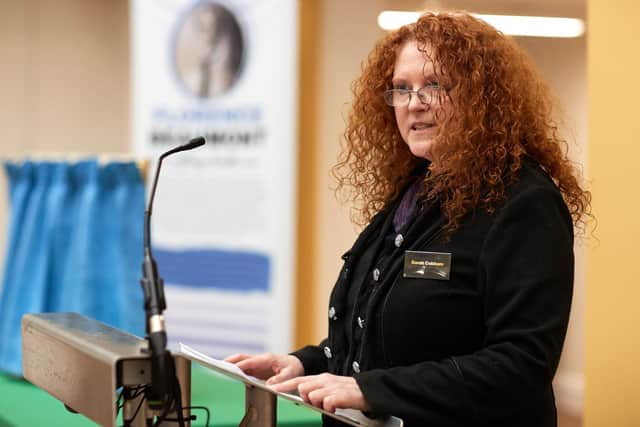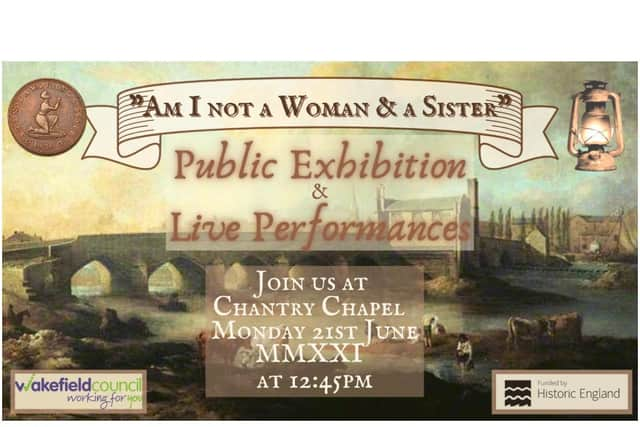Forgotten Women of Wakefield: Inspiring Elizabeth Dawson who led Wakefield's anti-slavery campaign to be honoured with blue plaque
and live on Freeview channel 276
Elizabeth Dawson made her mark on the city as the secretary of both Wakefield’s first Ladies Anti-Slavery Society and then its first mixed gendered Anti-Slavery Association in the 19th century.
Later this year, she will be honoured with a blue plaque marking her achievements, as part of the Forgotten Women of Wakefield (FWW) campaign, which is aiming to achieve blue plaque parity in the city.
Advertisement
Hide AdAdvertisement
Hide Ad

When the FWW project launched in 2018, there were 50 blue plaques in the city, of which 23 were dedicated to men and another 23 to buildings.
Just four recognised the achievements of Wakefield's historic women.
But now, thanks to the hard work of the FWW team, Elizabeth Dawson will become the latest woman to be honoured with a blue plaque - and the fifteenth organised as a direct result of the team's work.
Advertisement
Hide AdAdvertisement
Hide AdThe decision to honour Elizabeth with a plaque follows similar recognition earlier this year for Ann Hurst, the city’s first female newspaper proprietor and another anti-slavery pioneer.


Ann died in 1832 but in the following decades other women, including Elizabeth, continued to campaign against the slave trade, despite the likes of William Wilberforce being opposed to female involvement in abolitionist efforts.
Wilberforce felt their involvement in campaigning to be “proceedings unsuited to the female character as delineated in Scripture” and refused to acknowledge female signatures on petitions, as well as banning men involved with the cause from speaking at emerging Ladies Anti-Slavery Societies.
Wilberforce’s view was far from universal – fellow Abolitionist Sir George Stephen later hailed their extensive efforts as “the cement of the whole anti-slavery building – without their aid we never should have kept standing”.
Advertisement
Hide AdAdvertisement
Hide AdWhile the Slavery Abolition Act was passed in 1833, efforts continued to end the global trade.
By the 1850s the Wakefield Ladies Anti-Slavery Society was increasingly influential and managed to put on an event, believed to have organised by Elizabeth, that helped transform attitudes locally about the involvement of women in campaigning.
On June 21, a special exhibition at Chantry Chapel as part of the wider project will include two live events where actors will play Ann Hurst and Elizabeth Dawson.
Ann will pass on to Elizabeth a banner of hope and a lantern, a metaphor for the light they shone into the darkness of slavery.
Advertisement
Hide AdAdvertisement
Hide AdSarah Cobham is Director of Dream Time Creative, the company behind the FWW project, and has worked with researcher Helga Fox and other volunteers to uncover Elizabeth's story.
She said: “Elizabeth Dawson's impact in the town becoming so proactive in the anti-slavery movement cannot be underestimated.
"I see her as a quiet but determined influence who, as a contemporary of Clara Clarkson, whose connections and social standing during the 1850's was instrumental in the activities of the ladies, ensured leaflets were written and distributed enabling women to speak up and speak out about slavery.
"A powerful role model and influencer, Elizabeth's power lay in the persuasive use of her pen and as a fellow writer, I can really relate to that. I'm looking forward to our June 21st event at Chantry Chapel where a combination of exhibition and live performance will show the public how much Elizabeth had learnt from Ann Hurst, the first of our Abolitionists, and how powerful both their legacies are.”
Advertisement
Hide AdAdvertisement
Hide AdElizabeth's story has been uncovered as part of the ‘Am I Not A Woman And A Sister’ project, which is part of the Visionary Westgate Women and Forgotten Women of Wakefield campaign.
The work is a key part of the regeneration of the city's Westgate area, as part of the Wakefield Upper Westgate High Street Heritage Action Zone a four year, £4m project backed by Wakefield Council and Heritage England.
Kevin Trickett, Chair of Wakefield Civic Society, said: “The Society started putting up blue plaques in 1995 and now has over 60 plaques in place but many of these plaques commemorate the lives of men.
"For the last three years, we have been working with Dream Time Creative to support their quest to put up more blue plaques that celebrate the lives of women from Wakefield’s history: women who have contributed to Wakefield’s rich social, economic, cultural and political life but whose stories have at best been overlooked and, in many cases, completely forgotten.
Advertisement
Hide AdAdvertisement
Hide Ad"The plaque to Elizabeth Dawson, the 15th in the Forgotten Women of Wakefield series, tells of the important role she played in Wakefield’s anti-slavery campaign.”
Visit forgottenwomenwake.com to find out more about the project.